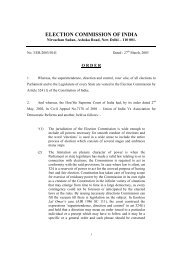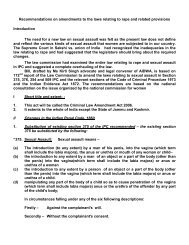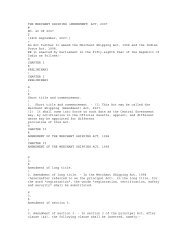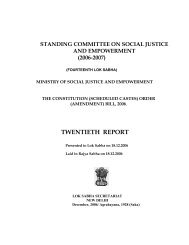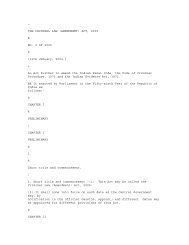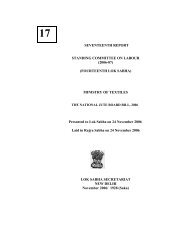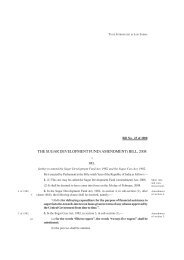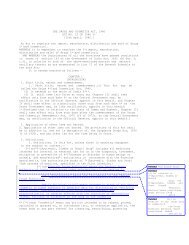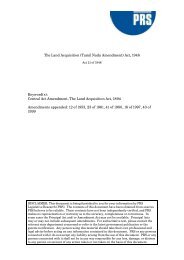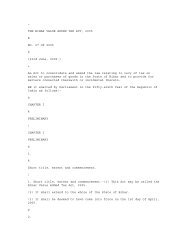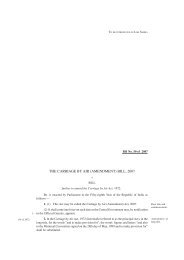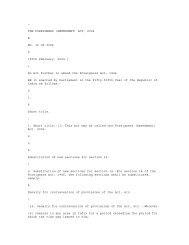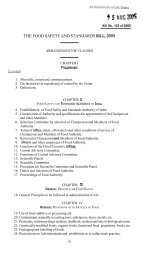Report of the Tiger Task Force - PRS
Report of the Tiger Task Force - PRS
Report of the Tiger Task Force - PRS
Create successful ePaper yourself
Turn your PDF publications into a flip-book with our unique Google optimized e-Paper software.
TIGER TASK FORCE REPORT JOINING THE DOTS ■handled by <strong>the</strong> director, Project <strong>Tiger</strong>, it isessential to streng<strong>the</strong>n <strong>the</strong> directorate withautonomy and personnel.6. The director, Project <strong>Tiger</strong>, should be delegatedpowers to deal with states under Section (3) <strong>of</strong> <strong>the</strong>Wildlife (Protection) Act, 1972, especially for <strong>the</strong>enforcement <strong>of</strong> Project <strong>Tiger</strong> guidelines.7. The role <strong>of</strong> director, Project <strong>Tiger</strong>, should not beconfined to tiger reserves. Instead, it shouldextend to o<strong>the</strong>r crucial forest areas as well whichhave viable tiger populations.8. A state steering committee for Project <strong>Tiger</strong>should be created, with <strong>the</strong> chief minister <strong>of</strong> <strong>the</strong>tiger range state as its chair.9. Management committees should be set up for eachprotected area. These committees will include localcommunity representatives, NGOs and researchers.10. Create a sub-cadre <strong>of</strong> wildlife specialists andpr<strong>of</strong>essionals.11. Independent audits <strong>of</strong> each reserve must beconducted annually; <strong>the</strong> information generatedmust be placed in <strong>the</strong> public domain.12. Build collaborative networks with researchers tomonitor change.Protection1. Each reserve must have a specific and detailedstrategy for protection. The independentmonitoring <strong>of</strong> <strong>the</strong> reserve must include anassessment <strong>of</strong> <strong>the</strong> enforcement mechanisms inplace and <strong>the</strong> patrolling efforts <strong>of</strong> field staff, sothat policy interventions can be designed.3. A clear strategy for protection is needed in<strong>the</strong> nor<strong>the</strong>astern reserves, where local people willbe <strong>the</strong> only ones capable <strong>of</strong> traversing andprotecting <strong>the</strong> area. There should also be a clearstrategy for <strong>the</strong> reserves controlled by naxalitesand o<strong>the</strong>r insurgent groups, where armedintervention by security forces might be <strong>the</strong> onlyoption.4. Fur<strong>the</strong>r recruitment <strong>of</strong> staff — foresters as well asguards — should be reserved for local villagers.The criterion for recruitment should be amendedso that it relaxes <strong>the</strong> formal educationalqualifications needed for <strong>the</strong>se positions andinstead, values skills in jungle craft. In addition,<strong>the</strong>re should be provision for in-service trainingfor locally recruited staff.5. Institutionalise training so that each reserve hasskilled and committed personnel.6. Disincentives and rewards based on independentmonitoring should be built into <strong>the</strong> system. Theincentives must be withdrawn in reserves thatscore low on <strong>the</strong> rating chart. This should be donewith complete transparency so that it is not seenas political or discriminatory. In fact, this movewill be a test for <strong>the</strong> independence and rigour <strong>of</strong><strong>the</strong> independent assessment as well.7. Investments in basic facilities should be made for<strong>the</strong> frontline staff:a. Housing camps in neighbouring districttowns, usually where <strong>the</strong> project headquarteris based, for families so that <strong>the</strong> education <strong>of</strong><strong>the</strong>ir children can be secured;b. Free rations for guards living in <strong>the</strong> camps.This practice is followed by many protectionforces and helps in <strong>the</strong>ir work.8. A staff welfare fund can be created for eachreserve, out <strong>of</strong> <strong>the</strong> income from tourism. This canbe used to supplement medical and o<strong>the</strong>r benefitsfor <strong>the</strong> staff.9. There must be an urgent review <strong>of</strong> <strong>the</strong> crisis inforestry services and steps that have been taken toaddress issues <strong>of</strong> training, personnel development,staff reviews and salaries.International trade in wildlife products1. Very proactive and strong measures are needed on<strong>the</strong> matter <strong>of</strong> international trade in wildlife andwildlife products. The Union ministry must workto shape <strong>the</strong> agenda at <strong>the</strong> Convention onInternational Trade in Endangered Species <strong>of</strong>Wild Fauna and Flora (CITES), to ensure that <strong>the</strong>global market for tiger products is investigated.The international community must be put underpressure to combat and destroy this trade.2. A bilateral relationship must be built up withChina to combat <strong>the</strong> trade in tiger parts. Theenvironment minister should take <strong>the</strong> lead bydiscussing and developing this relationship withhis Chinese counterpart, and this dialogue mustbe kept alive and ongoing. It is critical that Indiatakes <strong>the</strong> leadership on this issue and does notleave it to global institutions which are provinginadequate in this regard.Action plan for change 147



